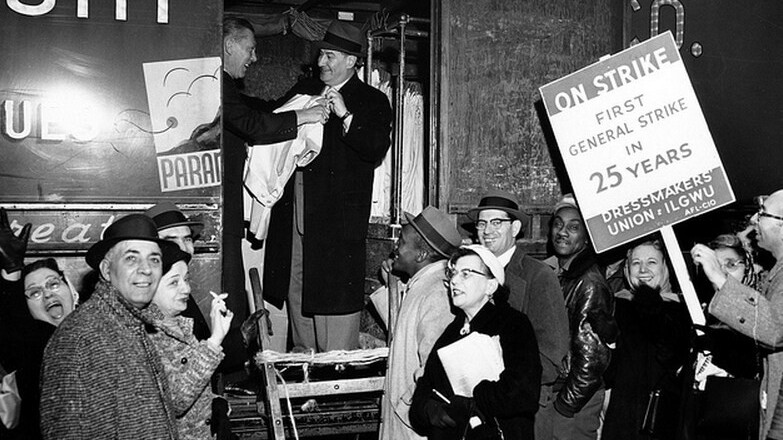
Today in the United States, the Copyright Alert System has reached the first mark of its “implementation phase.” Thus, after months of delay, the six strike system by which consumers will be directly contacted, dinged, and slowed for pirating and sharing copyrighted information is slowly coming online.
The Copyright Alert System (CAS) is known in most circles as ‘six strikes,’ a reference to its main deterrent method: escalating response to activities that violate copyright.
In short, here’s how it will work: content folks – think movie studios, labels and the like – will “join public peer-2-peer (P2P) networks” to see if their content is up for grabs, according to the Center For Copyright Information. Given that it will be – nearly everything is – the content denizens will ping ISPs about the issue, and the ISP will then reach out to the offending subscriber.
In the words of the Center, “[s]ubscribers are responsible for making sure their Internet account is not used for copyright infringement.” Thus, if your Internet connection is used by your sister’s husband’s dog to download Kanye when you are on vacation and they are house sitting, too bad. It’s still on you.
In a practical sense, we have reached a new age of copyright infringement and enforcement. This is now, for real:
Over the course of the next several days our participating ISPs will begin rolling out the system. Practically speaking, this means our content partners will begin sending notices of alleged P2P copyright infringement to ISPs, and the ISPs will begin forwarding those notices in the form of Copyright Alerts to consumers.
Six Degrees of Pain
Naturally, the amount of pain that can be brought to bear through the six strikes system will determine how much you have to fear if you are a fan of pirating your content. If you are a subscriber, as WebProNews notes, of “AT&T, Cablevision, Comcast, Time Warner [or]Verizon,” this is worth listening to.
The warnings are tiered into three categories: education, acknowledgement, and mitigation.
In the educational phase, users will be informed that they have been busted. This will be something of a shock, I would think. It’s no lawsuit but to be told that you have been caught pirating someone else’s content won’t be a welcome note. The infringing party will be given links and information on how to snag their content legally in the future. If this will drive iTunes sales or Spotify downloads remains to be seen.
The second level of warning, the acknowledgement phase, will force users to complete an action, watch a video, or something else to get past the system. The goal here, it appears, is to disrupt the user in a small way to make an impact.
Finally, the last phase, for strikes five and six, appears to differ by ISP, but via The Verge, here is what Verizon customers will be served with:
Fifth and Sixth Alerts:
Redirect your browser to a special web page where you will be given several options.
You can:
Agree to an immediate temporary (2 or 3 day) reduction in the speed of your Internet access service to 256kbps (a little faster than typical dial-up speed);
Agree to the same temporary (2 or 3 day) speed reduction but delay it for a period of 14 days;or
Ask for a review of the validity of your alerts by the American Arbitration Association. There is a $35 review fee (that you will get back if you win). For subscribers who meet certain need-based eligibility criteria. the review fee will be waived by the AAA.
Key: Your ISP will not be able to cut off your Internet connection as part of the CAS. So, the worst you can be is marked as a serial offender and slowed down.
So What?
What matters here is that the CAS is a system that is hard to bemoan overmuch: it doesn’t cut off your Internet connection, is slow to slow you, and doesn’t share your personal information from your ISP to the copyright holder in normal operation. It is far more intrusive than what was in place before.
Naturally, the CAS won’t deter those most determined to get around it. You can VPN, private share, or simply switch to streaming services that serve illicit content instead of downloading files directly, as ComputerWorld notes.
Still, most folks don’t know about that sort of thing. Instead, they will be about their merry way when the warnings start to pile up. This will put immense pressure on them, especially once the later tiers of warnings appear. Many will, I suspect, switch to the proffered free offerings.
And in the age of Spotify, Pandora, Netflix, and Amazon Instant Video, the reasons to pirate are on the decline. Certainly, there are endless asinine content restrictions online, as television studios and channels are slow to embrace the Internet as little more than a step-child delivery system, but change has been afoot for long enough now that the reasons to pirate are diminished.
The CAS exists now. It’s a new era.
Top Image Credit: Kheel Center
Get the TNW newsletter
Get the most important tech news in your inbox each week.





